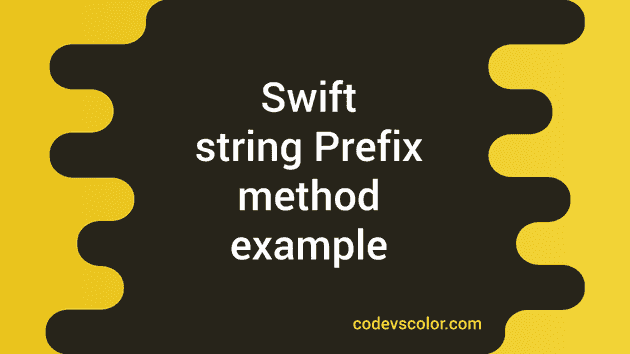String Prefix methods in Swift
Swift string provides a couple of methods to get and check prefix of a string. In this tutorial, I will show you these methods with examples :
1. hasPrefix : Check if a string starts with a prefix :
This method takes one string and checks if that string is prefix or not. It is defined as below :
func hasPrefix(String) -> BoolIt returns true or false.
Let’s take a look at the below example :
var givenString = "Hello String"
print(givenString.hasPrefix("Hello"))
print(givenString.hasPrefix("World"))It prints the below output :
true
false2. prefix(int) : Get subsequence up to a maximum length :
This method returns one subsequence up to a maximum length, i.e. the length we are passing as the parameter. It returns the starting characters :
var givenString = "Hello String"
print(givenString.prefix(5))
print(givenString.prefix(1))It will print :
Hello
H3. prefix(through: Index) : This method returns a substring from the start index to the index defined :
Similar to the above method, this is defined as below :
func prefix(through: Index) -> SubstringFor example :
var givenText = "Hello World !!"
print(givenText.prefix(through: givenText.firstIndex(of: "o")!))This example returns the substring from the start character to the first occurrence of ‘o’ .
Hello4. prefix(upTo: Index): returns a substring from the start index to the provided index, excluding the provided index :
This method is defined as below :
func prefix(upTo: Index) -> SubstringFor example :
var givenText = "Hello World !!"
print(givenText.prefix(upTo: givenText.firstIndex(of: "o")!))This will return one text from the start character up to ‘o’, excluding it.
Hell5. prefix(while: ch → Bool): Get initial subsequence using a predicate :
This method takes one predicate and returns all characters until the predicate returns false.
**
var givenText = "Hello World !!"
print(givenText.prefix(while: { (ch) -> Bool in
return ch != "l"
}))This example gets the initial subsequence of the string givenText using the provided predicate. It prints all characters up to the character before l.
It prints the below output :
HeYou might also like:
- Swift optional explanation with example
- Swift program to convert an array of string to a string
- How to trim whitespaces and other characters from a string in swift
- How to create different types of alerts and actionsheets in iOS swift
- Swift program to find the first index of a character in a string
- Swift String interpolation in 5 minutes

